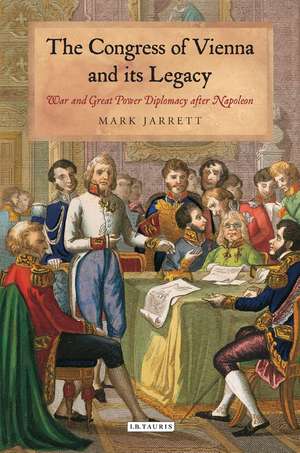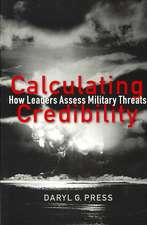The Congress of Vienna and its Legacy: War and Great Power Diplomacy after Napoleon
Autor Mark Jarretten Limba Engleză Paperback – 19 mai 2021
Preț: 182.51 lei
Preț vechi: 229.46 lei
-20% Nou
34.93€ • 36.26$ • 29.12£
Carte disponibilă
Livrare economică 04-18 martie
Specificații
ISBN-10: 1501384716
Pagini: 544
Ilustrații: 10 b/w integrated, 34 colour in 2 x 8pp plates
Dimensiuni: 156 x 234 x 48 mm
Greutate: 0.86 kg
Editura: Bloomsbury Publishing
Colecția Bloomsbury Academic
Locul publicării:New York, United States
Notă biografică
Cuprins
PART ONE: WAR
THE EUROPEAN STATE SYSTEM AND THE NAPOLEONIC WARS
The European State System of the Eighteenth Century
The Challenge of the French Revolution
The Rise of Napoleon
The Birth of the Napoleonic Empire and the War of the Third Coalition
The Napoleonic Empire at its Height
The Plans of Czartoryski and Pitt for the Reconstruction of Europe
2. THE COLLAPSE OF THE NAPOLEONIC EMPIRE, 1812-1814
Napoleon's Invasion of Russia and the Fourth Coalition
Castlereagh's Mission to the Continent
Negotiations at Châtillon
The Treaty of Chaumont
The Bourbon Restoration
The First Peace of Paris
PART TWO: PEACE
3. THE CONGRESS OF VIENNA, 1814-1815
The Decision to Convene a Congress
Preliminary Negotiations in Paris and London
The Characters of the Statesmen
Diplomatic Aims on the Eve of the Congress
The Procedural Question
The Social Life of the Congress
The Polish Question and Alexander's Diplomatic Triumph
The Saxon Question and the Secret Treaty of 3 January 1815
The Other Questions at the Congress
The Question of a General Guarantee
Assessments of the Settlement
4. THE BIRTH OF THE CONGRESS SYSTEM, 1815-1818
The Hundred Days
The Second Peace of Paris and the Quadruple Alliance
The Holy Alliance
The Allied Occupation of France
The Congress of Aix-la-Chapelle
PART THREE: DIPLOMACY
5. THE ALLIANCE IN OPERATION, 1819-1820
Central Europe and the Carlsbad Decrees
Peterloo and the Six Acts
The Revolution in Spain and Castlereagh's State Paper of 5 May 1820
The Neapolitan Revolution and Metternich's Dilemma
6. RIFT AND REUNION, 1820
Recenzii
The system established by the Congress of Vienna is of great interest to both historians and political scientists, and Mark Jarrett's is one of the rare treatments that will appeal to both groups. His narrative gives clear guidance through the complexities of the era and his analysis engages the central arguments about the period. It is a model treatment. It really is THE book on the period and will attract and enlighten readers for a generation to come.
Jarrett's massive and impressively researched volume promises to become our generation's authoritative study of the peace settlements of 1814-1815. Jarrett begins with the wars of the French Revolution, shows how they morphed into Napoleon Bonaparte's wars for empire from 1801 and 1805, then recounts how the adversaries of France fitfully coalesced, sometimes attempted their own alliances with Bonaparte, and finally came together to defeat his over-extended armies. He follows with great clarity the negotiation of the settlements and the decade of post-Vienna diplomacy and interventions from 1815 to 1825 . . . Jarrett follows these two crowded decades with admirable narrative clarity and thoroughness -- concluding with the last hurrah of successful great-power agreement by the 1830s to establish a Greek monarchy and to recognize a separate Belgian kingdom. Given the frequent reshuffling of territories and regime forms and the proliferation of treaties made, broken, and remade, the book is a great achievement.
Mark Jarrett illuminates a vital two decades in European history that have long been neglected. His is indeed a wonderful book-clearly written, extremely well-researched, open to a whole variety of explanations from historians and political scientists, well balanced, fair in its judgements of historical characters and contemporary academic opinion, and seminal in its allusions to present-day events. I have little doubt that this book will become the standard work on the Congress System.
Mark Jarrett's beautifully written book deploys a great deal of information without ever getting lost in detail. It weaves together personality and policy, providing a clear analysis of political structures as well as a vivid portrait of personalities.
Jarrett's ground-breaking book is essential reading for anyone interested in peace-making and conflict resolution in the nineteenth century. Erudite, compelling, and finely-argued, it offers a new interpretation of the development of the Congress system of international diplomacy from the Congress of Vienna on. The analysis of the politics of intervention will be of particular interest to people interested in international relations and the crises of the 21st century, and it is packed with wonderful pen-pictures of some of the most colourful political figures of the age.
This will become the definitive work on the Congress of Vienna with all its personalities, intrigues and significance for the nation state and how we think of diplomacy today.
Jarrett's book is an excellent analysis of the studied subject, a worthy read for scholars as well as students and the general public for its academic value and complexity as well as the lucid and articulate narration. The clarity of the narrative results not only from the well-arranged structure and readable style but also from useful supplements like maps, a chronological overview and the annotated list of the most significant personalities. . . Mark Jarrett's book is a commendable, scholarly effort. I dare to say that it became a classic work on the Congress of Vienna and the congress period after 1815 at the very moment of its publication...
This book is more than a comprehensive and richly detailed account of the complex diplomatic and international relations in post-Napoleonic Europe, which will undoubtedly become a standard reference . . . It is more importantly, a fascinating journey through the Europe of early the nineteenth century, from Sicily to Russia, from England to the Balkans . . . The Congress of Vienna and its Legacy successfully combines well-balanced historical research with fresh and vivid history-telling in the best sense of the word, truly enjoyable for all kinds of readers. This is one of the most comprehensively documented and captivating books on the history of the Congress System published in years.
Mark Jarrett's work takes its place as the most reliable and detailed narrative of the period of Congress diplomacy from 1814 to 1822, surpassing the older works of Harold Nicolson and Henry Kissinger as well as the newer volumes of Jacques-Alain Sédouy . . . Across the whole span, Jarrett knowledgably interweaves the historical context and background, in a way that should serve the needs of general readers while also offering something for period specialists.
Jarrett is a terrific storyteller, enlivening his narrative with memorable vignettes. . . .In an attempt to extend the scope of his narrative, Jarrett delves into IR debates around the balance of power, security communities, and related subjects . . . The primary contribution of The Congress of Vienna . . . lies in the book's comprehensive account of the Vienna settlement and its exemplary archival research.
One of the strengths of The Congress of Vienna is its emphasis on the leaders' deep-seated suspicion and fear of revolution. Britain's Lord Castlereagh shared the conservative sympathies of his European counterparts, but the continental powers' desire for counterrevolutionary intervention led Britain to distance itself by the early 1820s. This story has been told before, but Jarrett's account is distinctive in the detail with which it shows how an explicit policy of counterrevolution proved incompatible with British parliamentary politics.
Descriere
**CHOICE Outstanding Academic Title**In September 1814, the rulers of Europe and their ministers descended upon Vienna after two decades of revolution and war. Their task was to redraw continental borders following the collapse of the Napoleonic Empire. Inevitably, all of the major decisions were made by the leading statesmen of the five 'great powers'-Castlereagh, Metternich, Talleyrand, Hardenberg and Tsar Alexander of Russia. The territorial reconstruction of Europe marks only one part of this story. Over the next seven years, Europe witnessed unrest in Germany, Britain, and France, and revolution in Latin America, Spain, Portugal, Naples, Piedmont, Greece, and Romania. Against this backdrop, the Congress of Vienna was followed by an audacious experiment in international cooperation and counter-revolution, known as the 'Congress System'. This system marked the first genuine attempt to forge an 'international order' based upon consensus rather than conflict. The goal of the Congress statesmen was to secure long-term peace and stability by controlling the pace of political change through international supervision and intervention.The fear of revolution that first gave rise to the Congress System quickly became its exclusive concern, sowing division amongst its members and ironically ensuring its collapse. Despite this failure, the Congress System had a profound influence. The reliance on diplomacy as the primary means of conflict resolution; the devotion to multilateralism; the emphasis on international organization as a vehicle for preserving peace; the use of concerted action to promote international legitimacy - all these notions were by-products of the Congress System. In this book, Mark Jarrett argues that the decade of the Congresses marked the true beginning of our modern era. Based on original research and previously unseen sources, this book provides a fresh exploration of this pivotal moment in world history.

